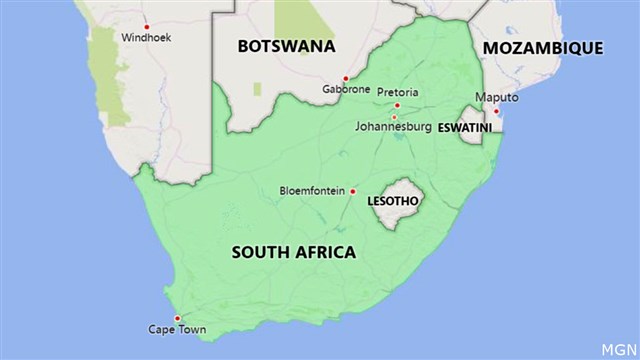In the aftermath of the recent elections in South Africa and the newly formed Government of National Unity (GNU), some political tensions remain and there are concerns about the country’s direction and how Blacks will fare. Cyril Ramaphosa was sworn in for a second term as president.
He touted his coalition government as the “beginning of a new era,” reported Al Jazeera. His swearing-in ceremony took place June 19. The May elections produced no outright winner, forcing the ANC to strike deals with five other parties, including the center-right Democratic Alliance (DA), to form a government of national unity, the outlet noted.

The election’s unprecedented deadlock came after the ANC lost its 30-year parliamentary majority, which laid bare the frustrations of millions of poor Black South Africans still seeking a better life after decades of White minority rule.
Many deserted the ANC for parties to the left of the ANC, like former president Jacob Zuma’s Umkhonto we Sizwe Party (MK) and the Economic Freedom Fighters (EFF) Party, receiving an impressive 21.7 percent and 9.5 percent of the vote, respectively.
Left out of the unity government—namely, the EFF, MK, United Democratic Movement, Al Jama-Ah, United African Transformation Movement, and Pan African Congress— formed the “Progressive Caucus” opposition alliance.
Atlasnews.co reported that sharp words have flown between parties. “IFP (Inkatha Freedom Party) spokesperson Mkhuleko Hlengwa stated on the sidelines of the National Assembly, ‘Julius (Malema, head of EFF) can go jump off the nearest cliff.
He is a danger to society, a danger to our democracy, a risk to the peace and stability we are trying to build. He thrives on stoking violence and does not have the collective interest of this country at heart,’” atlasnews.co reported.
These comments resulted from Malema calling the IFP an “Oppenheimer party” due to reports the IFP received substantial funding from the South African Oppenheimer family. For over 100 years, the family controlled Africa’s diamond industry. The DA party has also received substantial campaign contributions via the Oppenheimers.
Swift reaction to the ANC-DA plus coalition came from Dr. Ntando Sindane. Sindane is a lecturer at the Department of Public Law and Jurisprudence at the University of Western Cape. While appearing on the YouTube-based SMWX show, he invoked the name of South Africa’s “father of Black consciousness,” Steve Biko.
“Steve Biko is probably more important for this moment in time than any other revolutionary scholar of philosophy” because of the things that he reminds us of, particularly things that inform us about the substance of the DA, Dr. Sindane explained.
“Remember, during apartheid you had the conservatives and then you had the liberals. The liberals always behaved as if they were the better Whites with Black people. Steve Biko taught us that this liberal grouping of White people were not any better than conservatives.
They wanted relationships with us as Black people on an individual level. But fundamentally, they were not opposed to a system of apartheid and the system of Whiteness.”
Dr. Sindane added that until Whites relinquish White privilege and White Supremacy, they remain White people which is what the Democratic Alliance (DA) represents. “White people and the Democratic Alliance (are) far from dealing with these questions because in their own discourse, they deny that race (and racism) is an issue,” he continued.
In a recent address to the nation, former president Jacob Zuma spoke on what he said is the “selling out” of the aspirations of South Africa’s 80 percent Black African population. However, his words were framed in South Africa’s White press and Western corporate-run media outlets as “empty and violent rhetoric” to hurt the newly formed coalition efforts and President Ramaphosa.
According to Zuma’s message to the nation, he said that Ramaphosa’s “united effort is necessary because the (May 29) 2024 election has resulted in the consolidation of right-wing and reactionary forces who are opposed to economic freedom, racial economic transformation, racial equality, and land repossession led by the ANC of Ramaphosa and the Democratic Alliance (DA), which is the replacement of the racist (apartheid) National Party of Hendrik Verwoerd, B..J. Vorster, P.W. Botha, and F.W. de Klerk.”
Concerns are escalating that the newly formed coalition government could usher in a return to White-minority rule in the predominately Black country.
Redge Nkosi is the executive director and head of research for money, banking and macroeconomics at First-Source Money. He is also the founding director of the London-based International Monetary Reform.
He wrote in the online publication iol.co.za: “Historical institutionalism remains strong and alive, especially in the very critical areas where radical transformation should have long taken place: macro-economic/financial institutions.”
“It is also in these areas that the ANC’s powerful clique is weakest, leaving local and foreign European groups exercising disproportionate influence and control,” he notes.
“Therefore, a combination of historical institutionalism, regulatory, and policy capture on the one hand ANC’s tiny clique and its patronage networks on the other, have rendered the economy highly untransformed and totally in the hands of Europeans.”
Follow @JehronMuhammad on X,
formerly Twitter













